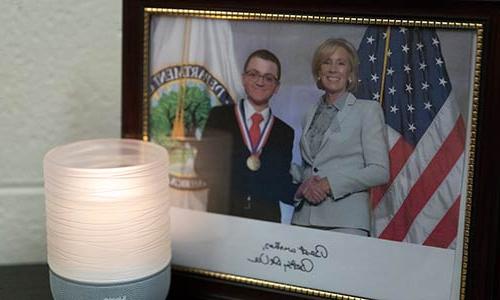While 15-year-old Anthony Sikorski faces the same challenges any adolescent does, he is not your typical teenager. Most 15-year-olds don’t attend college, receive presidential recognition and even create course material that future collegiate scholars will rely on for years to come. Sikorski, who also has cystic fibrosis, adrenal insufficiencies and Ehlers-Danlos syndrome, was just 14 when accepted by Carroll. He began this fall as Carroll’s youngest incoming first-year student.
Given Sikorski’s intelligence and drive it wouldn’t be difficult to see him fought over by numerous universities, but he repeatedly uses two words in explaining why he chose Carroll: welcoming and accommodating. Carroll faculty and admission staff worked hard to make sure his schedule would facilitate needed medical treatments, that classrooms would be accessible to his wheelchair and that he’d be able to spend plenty of time with his family.
And then there are the facilities. Sikorski was particularly impressed with the Michael and Mary Jaharis Science Laboratories building. This fall, he experienced biology and chemistry labs in Jaharis, and is looking forward to more classes there, saying he admired the thought that went into the structure. “It’s very impressive. I’d like to thank the investors and the people who planned and built it. It’s a nice space to be in.”
Sikorski was also drawn in by the fact that three influential adults in his life are Carroll alumni. Nurse Kristi Kirk ’95 and biology teacher Douglas Drenzek ’93 from Arrowhead High School, where Sikorski attended, along with piano teacher Joseph Lecher ’07, are all Carroll graduates he is close to.
Sikorski said he has found Carroll very welcoming. “Even before the official academic semester started, people from the biology department said I could do some informal research,” he stated. The research he and Dr. Todd Levine are conducting will be used in assignments for future biology students. In addition, biology lecturer Dr. Christine Schneider has discussed a lab position with him. He’s excited, as Schneider’s research deals with bacteria that can cause lung infections among cystic fibrosis patients.
Sikorski has a ready response when asked about his youth: “hard work and dedication.” He has worked tirelessly to go above and beyond in his courses, driven by a deep passion for knowledge.
After Carroll, Sikorski hopes to attend medical school, “inspired almost exclusively by my medical conditions.” Should his age bar him from attending medical school immediately following graduation, he might opt to pursue a doctorate and perhaps become a geneticist to help people dealing with illnesses such as his. As for his own health, Sikorski said that “if people can hear me talk about my medical problems, talk about it once, and not bring it up in the future, I prefer it.” He doesn’t want pity. After all, his ailments aren’t things he can change or control.
“I’m just very fortunate things have worked out the way they have,” he said. “Could things have worked out better? Certainly. Is it a pressing thought on my mind? No. The present is well enough. I have no regrets about anything. If you put yourself to work and show dedication and resilience in the field you choose, life generally has a way of rewarding that.”

State of Wisconsin Certificate of Achievement signed by Governor Tony Evers

Sikorski met President Donald Trump and Education Secretary Betsy DeVos through a presidential scholars program

Sikorski and Secretary DeVos
Sikorsky's story caught the attention of WTMJ4 report Carole Meekins, who featured him in a recent Positively Milwaukee report.
Watch the report here
Stay Informed With F1RST Magazine